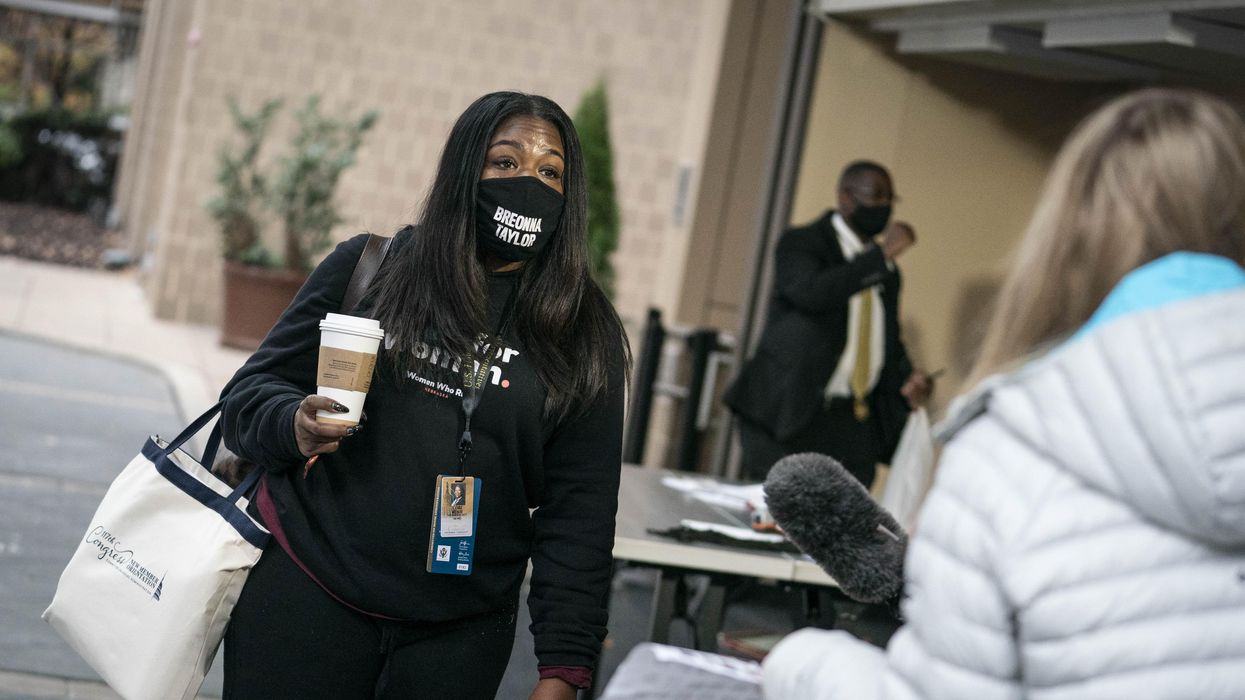Terrell is executive director and Reilly is a research fellow at RepresentWomen, a nonpartisan organization advocating for policies that would result in more women holding office.
Electoral systems matter. They have a profound impact on the government and elected officials we end up with. They influence who is most likely to run for office, win, serve and end up leading. They also shape the resulting government and inform our perceptions of our democracy and institutions.
Our winner-take-all voting system is continuing to fail us and our democracy — because it results in too many of our elected officials getting into office with less than a majority of votes and leaves large segments of our population underrepresented. Women make up 51 percent of the electorate, for example, but they hold only 25 percent of the country's elected offices.
Even after another record-breaking congressional election cycle, women will only make up at most 28 percent of the House next year and at most 26 percent of the Senate. (A couple of seats in each chamber have not been awarded.) And even though the highest number of women ever were elected to Congress last month, the United States will likely rank 70th in the world for women's share of seats in the lower legislative chamber — in the same bracket as Afghanistan, Mali, Slovenia, Kazakhstan, Vietnam, Bulgaria and Iraq. The majority of countries that continue to do better than the United States have taken intentional steps, such as modernized recruitment strategies and fair representation electoral systems, to reach and sustain political gender parity.
Our latest report on women's representation internationally, "Achieving Gender Parity: Systems Strategies Around the World," found that the United States is continuing to fall behind much of the world for women's representation. This summer the country ranked 83rd because at that point women held only 24 percent of the seats in the House. More than half the countries outranking the United States have a proportional representation system, while one in five of them used a mixed electoral system.
We found that electoral reforms gaining popularity in the United States, among them ranked-choice voting and multimember districts, have resulted in many successes for descriptive representation around the world. Australia, for example, uses ranked elections for both halves of Parliament. In the House, legislators are elected from single-member districts and women hold 31 percent of the seats — pushing their country to 50th in the gender parity rankings. The Senate has multimember districts (the system is sometimes known as single transferable voting) and now half the senators are women.
Nineteen municipalities in the United States already use ranked-choice voting, and many have seen improvement in gender representation, and have seen many successes for improving the number of women in city hall. In the most recent round of city elections, women made up 39 percent of the candidates in ranked elections — and 42 percent of the winners.
And in November, an additional five jurisdictions voted to adopt ranked voting for local elections, while voters in Alaska approved RCV for all state and congressional races starting in two years.
Although implementing ranked-choice voting at the local and state level is an important step, the reform we need in the long-term is called the Fair Representation Act, which would introduce ranked-choice voting and multimember districts to elections for the entire House of Representatives.
Passage of the bill would increase the number of competitive seats and political accountability, give voters a more informative choice and improve the descriptive representation in Congress. Projections from FairVote and RepresentWomen found that making the legislation a reality could increase the number of women in the House by as much as 38 percent. It could also increase the political power for all communities of color — increasing the number of Black members by as much as one-third, adding 15 more Latino members and pushing the number of Asian and Pacific Islander lawmakers into double digits.
But building a robust pipeline of qualified women candidates is not enough so long as gendered structural barriers persist in our electoral system.
A record $213 million was raised and spent by the 171 women running as congressional challengers this fall — and only 10 of them won, a success rate of 6 percent. This dismal statistic is not the result of unqualified candidates or a lack of financial support, but instead it's the byproduct of a voting system designed to favor incumbents at the cost of challengers and districts where both parties can be competitive.
But, there is a solution: Learn from countries around the world and implement systems strategies, starting with ranked elections and multimember districts, that will yield a truly representative democracy in our lifetimes.




















